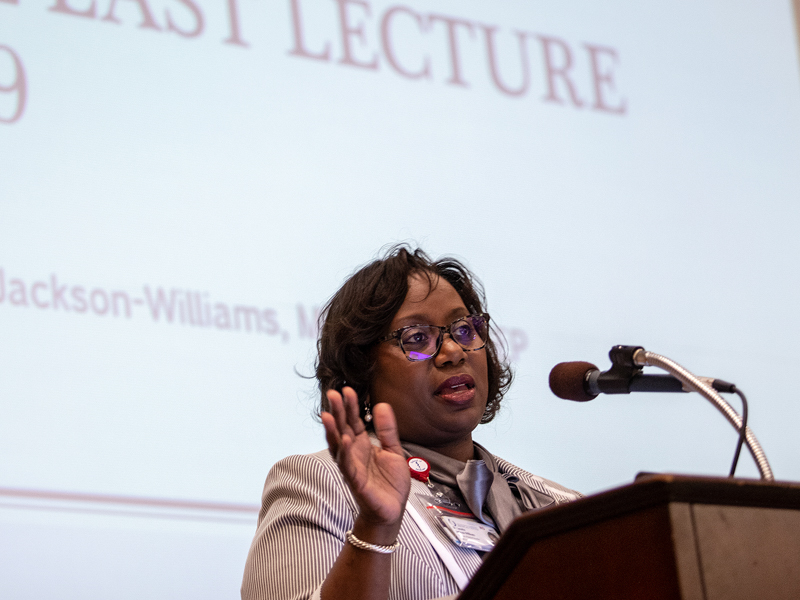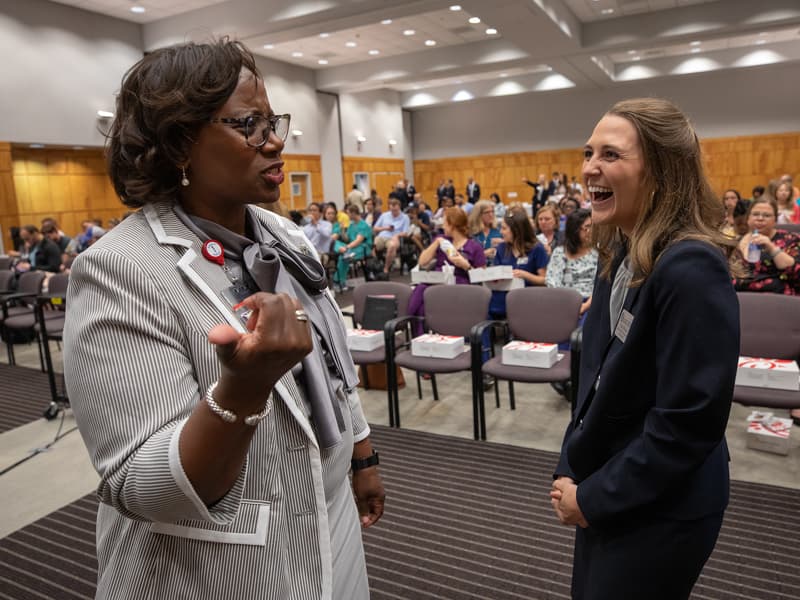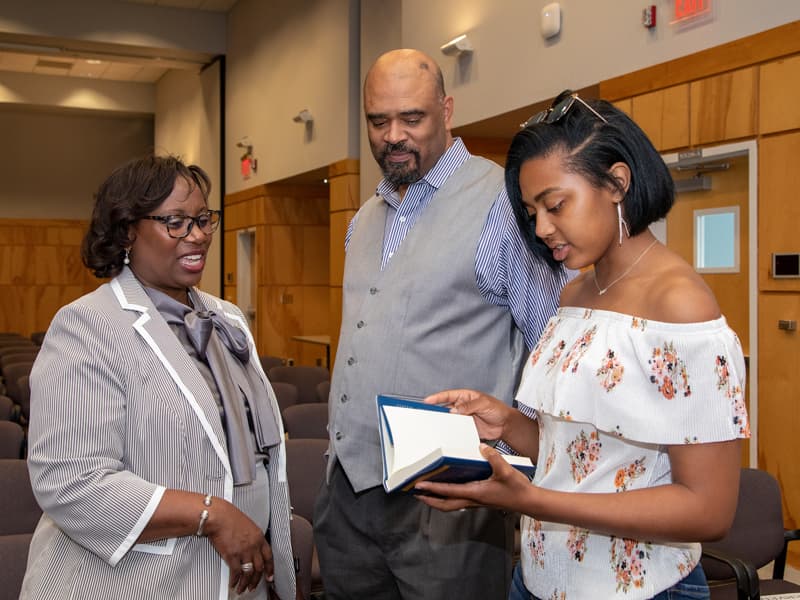ER tragedy poses life lesson for professor – and parent

For Dr. Loretta Jackson-Williams, there was a particular day in the Emergency Department that didn’t end when her shift did.
A young man died of a gunshot wound to the chest, “and it was difficult to walk away from work without taking it with me,” said Jackson-Williams, professor of emergency medicine and vice dean for medical education at the University of Mississippi Medical Center.
Waiting for her at home was another young man, one who reminded her of the victim: her son Jordan.
In that moment, responding not as a doctor, but as a parent, she realized what patients and their loved ones must go through in the emergency room, “overwhelmed by that reality.”
“Perspectives are important,” said Jackson-Williams, describing the first of her “Seven Major Realizations” during Wednesday’s fourth annual Last Lecture.

Sponsored by the Office of Alumni Affairs, Student Alumni Representatives, and the Associated Student Body, the Last Lecture has been presented here each year since 2016 by Medical Center faculty members as if this is their last chance to deliver some final words of wisdom.
More and more institutions of higher learning have adopted their own “last lecture” events, especially since 2007, following a memorable presentation by a Carnegie Mellon University professor, Randy Pausch.
A pancreatic cancer patient aware of his terminal diagnosis, Pausch offered advice that became the basis of a best-selling book, from which Jackson-Williams quoted: “‘We have a finite amount of time. Whether short or long, it doesn't matter. Life is to be lived.’”
For Jackson-Williams, life is family. In fact, among the approximately 150-200 students, residents, faculty and staff attending her address was daughter Taylor, older sister Mavis Anderson, cousin Brenda Davis and husband James Williams.
Eight years ago, on her birthday, her husband was released from the hospital after treatment for meningitis – “the best birthday present I could have had,” she said.
“This was a moment for my family to re-evaluate priorities,” she said of her husband’s recovery.

Interviewed following the lecture, James Williams described how much family means to his wife: “The closeness is not that localized. It’s huge for her on both sides of the family,” said Williams, who works for the Washington, D.C.-based National Center for Education and the Economy.
“She’s as probably as close to my side of the family as I am.”
An Indianola native who joined the Medical Center faculty 20 years ago, Jackson-Williams was introduced Wednesday by medical students Emily McBride and Tori Wilson.
One-half of a set of twin sisters, Jackson-Williams grew up in the Delta under the guidance of two educators who were also her parents.
She was on the tennis team at Gentry High School and, later, at Tougaloo College, where she studied chemistry while singing in a gospel choir and participating in dance. As a college student, she worked off and on as a substitute school teacher.
Holding a doctorate in biochemistry, as well as a medical degree, she is a graduate of the Boston University School of Medicine, and completed her emergency medicine residency at Highland Hospital in the Alameda County Medical Center of Oakland, California.
In 1999, she joined UMMC’s Department of Emergency Medicine, focusing on student education there. Over the years, she developed education programs for students and residents; served on, and then rose to chair of, the School of Medicine Curriculum Committee; and became part of the medical school’s administrative team.
After serving for about six years as associate dean for academic affairs, her responsibilities grew when, in 2015, she was named vice dean for medical education.
It’s likely that many of the students and residents she has helped educate voted on a slate of this year’s Last Lecture nominees, from which she was eventually chosen; 249 participated in the vote, said Patrick Cooper, alumni engagement associate in the Office of Alumni Affairs.
Throughout her remarks to them, Jackson-Williams often used anecdotes from her family life. Among her observations were:
- “Find a way to recharge.” For her, “faith has always been this active force in my life. It sustains me.” As does making bread during difficult times, she said, because “it smells and tastes good.” Since her loved ones reap the benefits of her therapeutic baking, she said, “I’ve been told on more than one occasion that I need have a bad day."
- “Going to school for an education is like picking up a box of puzzle pieces: You don’t know what it’s going to look like unless you have a picture on the front end.”
- “People rise to expectations; we just default to reality. … For students, the reality is: If there are no expectations of what you’re working for, there is a feeling of being lost and unanchored.”
- “We all get to our destination in our own way.” Projecting a slide from a rafting trip she took with her husband and two children in Costa Rica, Jackson-Williams pointed out that only three people remained in the boat for the photograph: Before it reached a 15-20-foot drop, her daughter Taylor had decided to get out and walk. “If something had happened to us,” Jackson-Williams said, “she’s the only one coming home. Sometimes you stay in the boat, sometimes you should get out of the boat.”
Safe and dry and sitting in the audience as she listened to her mom’s remarks in the Student Union, Taylor, now a student at Mississippi State University, hadn’t realized how long her mother had been serving at UMMC, she said.
“I’m 19; she’s been here since before I was born. Doing what she’s done for 20 years and being our mom at the same time attests to how powerful she is as a woman.”

